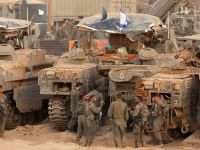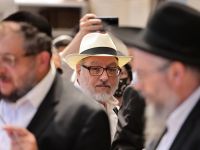Israel said early Sunday that it had reached an agreement with the Palestinians on measures to halt the violence during a security meeting at the Erez crossing point in Gaza Saturday night, however, chief Palestinian negotiator emerged from the security meeting much less upbeat.
A spokesman for Israeli Prime Minister Ariel Sharon hailed the three-hour overnight security meeting with Palestinian representatives as "serious and positive," reported Haaretz newspaper.
The meeting, held near the Erez crossing point between the Gaza Strip and Israel, "was carried out in a serious and positive atmosphere," the spokesman said at the end of the meeting.
Israel was represented by the head of the Shin Bet, Avi Dichter, the head of planning at the General Staff, Major General Giora Eiland and the chief of the southern command, Doron Almog.
The Palestinians were represented by the head of the General Intelligence Service, Amin al-Hindi; and the head of national security in the Gaza Strip, General Abd al-Razeq al-Majaideh.
The two parties "decided to cooperate on a security plan and to apply measures aimed at putting an end to the violence and terrorism," as well as new measures to ease the restrictions on the Palestinian population, he added.
The paper said that Israeli and Palestinian commanders on the ground are expected to renew meetings Sunday.
However, the chief Palestinian negotiator at the security talks was much less enthusiastic, dismissing Israel's response to questions regarding incursions into Palestinian-run areas in the Gaza Strip as "insufficient," the paper quoted him as saying.
"The responses given by Israel were completely insufficient and do not satisfy the minimum demands" of the (Palestinian) population," Palestinian General Abdelrazek al-Majaidada said.
The general, in a statement, said that the Palestinian delegation had handed over a list of Israeli violations of the autonomy accords.
This document cited the demolition of Palestinian buildings by Israeli bulldozers, the closure of road and border crossings, bombardment of Palestinian positions and the multiplication of Palestinian casualties of Israeli attacks.
In the letter, the Palestinian delegates decried recent Israeli "armed incursions" into Palestinian-controlled territory as well as operations targeted against Palestinian activists.
They demanded the resumption of the use of VIP cards to enable Palestinian leaders to travel freely and the reopening of the Rafah airport in the Gaza Strip, said the paper.
On April 16, the Israeli army mounted a major incursion into the Gaza Strip, sending in heavy tanks and bulldozers, after mortar shells were fired at the Israeli town of Sderot, in the south of the country.
The Palestinians affirmed that for their part they had "taken measures to reduce the violence, notably by banning all firing from populated (Palestinian) areas" towards Israeli targets.
However, the Palestinian side declared itself ready to "resume security cooperation" with Israel if their demands are satisfied.
According to them, the Israeli team had committed to giving a reply within two weeks on the reopening of the airport, Haaretz added.
BODY OF ISRAELI MAN FOUND NEAR RAMALLAH
The body of a 38-year-old Israeli man, Stanislav Sandomirski, was found in the trunk of his car late Saturday night, near the West Bank village of Surda in the Ramallah area, reported Haaretz.
There were signs of physical violence on Sandomirski’s body and police suspect that the motive for the murder was “nationalistic.”
Surda is in Area B, which is under joint Israeli-Palestinian control.
12 PALESTINIANS INJURED IN CLASHES WITH ISRAELI TROOPS IN GAZA
12 Palestinians were injured overnight during confrontations with Israeli troops in the Gaza Strip and West Bank, reported Haaretz.
Palestinian hospital officials reported that 12 people were wounded near the Palestinian-ruled Rafah in southern Gaza and the West Bank town of Qalqilya.
A mortar shell fired by Palestinians fell near the boundary of a Jewish settlement in the Gaza Strip early Sunday, an Israeli military spokesman said, adding that there were no casualties.
If confirmed, the attack would be the first of its kind since Palestinian President Yasser Arafat ordered an end to mortar attacks from Palestinian areas on both Israel proper and Jewish settlements.
The spokesman said the mortar shell fell just outside the boundary fence of the Netzarim settlement, said AFP.
Meanwhile, senior Israeli security officials expressed doubt that the Palestinian Authority had arrested 16 Hamas activists who had been involved in firing mortar shells into Israel, according to The Jerusalem Post newspaper.
They said they have no proof of the arrests.
They stated that in the past the PA had enacted a “revolving door” policy, which involved releasing prisoners a mere few days after their arrests were announced.
The security sources said that the Palestinian Authority's head of Preventive Security in the Gaza Strip, Mohammed Dahlan, was involved in the mortar shelling.
They went on to say that his deputy, Rashid Abu-Shabak, had distributed the mortars and bombs, manufactured in a PA factory in Gaza, to a number of organizations, including Hamas.
Apparently though, Hamas has done the bulk of the shooting into Israel while other organizations have shot mostly into settlements in Gaza -- Albawaba.com
© 2001 Al Bawaba (www.albawaba.com)







